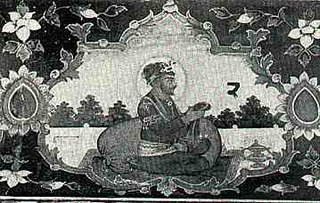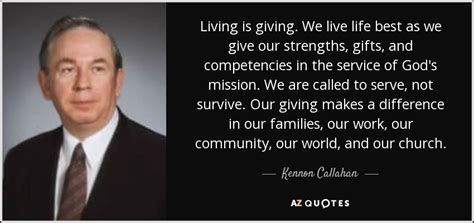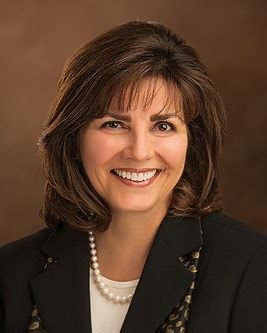A Quote by Rachel Held Evans
Whenever we show others the goodness of God, whenever we follow our Teacher by imitating His posture of humble and ready service, our actions are sacred and ministerial. To be called into the priesthood, as all of us are, is to be called to a life of presence, of kindness.
Related Quotes
Whenever we choose to come unto Christ, take His name upon us, and follow His servants, we progress along the path to eternal life. In our mortal journey, it is helpful to remember that the opposite is also true: when we don't keep the commandments or follow the promptings of the Holy Ghost, our opportunities are reduced; our abilities to act and progress are diminished.
Motherhood is not what was left over after our Father blessed His sons with priesthood ordination. It was the most ennobling endowment He could give His daughters, a sacred trust that gave women an unparalleled role in helping His children keep their second estate. As President J. Reuben Clark Jr. declared, motherhood is ‘as divinely called, as eternally important in its place as the Priesthood itself.’
The quality of everything we do: our physical actions, our verbal actions, and even our mental actions, depends on our motivation. That's why it's important for us to examine our motivation in our day to day life. If we cultivate respect for others and our motivation is sincere, if we develop a genuine concern for others’ well-being, then all our actions will be positive.
In scripture we are told of some trusting in God and others trusting in idols, and that God is our refuge, our strength, our defense. In this sense God is the rock of his people, and false Gods are called the rock of those that trust in them. In the same sense the Gods of the King who shall do according to his will are called Mahuzzims, munitions, fortresses, protectors, guardians, or defenders.
The Bible is teh means through which we are introduced to Jesus and invited to follow Him in the life of humility and service. Secured by the knowledge that in Christ, our origin... and destination is God, we will yield the fruit of service to God. This is the "so what" of our Bible reading. Does it shape our spirits in love and humility? Does it lead us more fully into life with God? (Life with God, p. 34-35)
The practice of kindness is the daily, friendly, homely caring form of love. It is both humble-a schoolboy bringing his teacher a bouquet of dandelions-and exalted-a fireman giving his life to save someone else's. Kindness is love with hands and hearts and minds. It is both whimsical-causing our faces to crack into a smile-and deeply touching-causing our eyes to shimmer with tears. And its miraculous nature is such that the more acts of kindness we offer, the more of them we have to give, for acts of kindness are always drawn from the endless well of love.
If... God highly exalted Christ because He humbled Himself, suffered dishonour, was tempted and endured a shameful cross and death for our sake, how will He save, glorify and raise us up if we neither choose humility, nor show love to our fellows, nor gain our souls by enduring temptation (cf. Lk. 21:19), nor follow the saving Guide through the 'strait gate' and along the 'narrow way' leading to eternal life (Mt. 7:14)? To this end we were called, says Peter, the chief Apostle, ' Because Christ also suffered for us, leaving us an example that we should follow His steps' (I Pet. 2:21).
In the intercourse of social life, it is by little acts of watchful kindness recurring daily and hourly,--and opportunities of doing kindnesses if sought for are forever starting up,--it is by words, by tones, by gestures, by looks, that affection is won and preserved. He who neglects these trifles yet boasts that, whenever a great sacrifice is called for, he shall be ready to make it, will rarely be loved. The likelihood is, he will not make it; and if he does, it will be much rather for his own sake than for his neighbor's.
Each one of us has some kind of vocation. We are all called by God to share in His life and in His Kingdom. Each one of us is called to a special place in the Kingdom. If we find that place we will be happy. If we do not find it, we can never be completely happy. For each one of us, there is only one thing necessary: to fulfill our own destiny, according to God's will, to be what God wants us to be.
Right from the moment of our birth, we are under the care and kindness of our parents, and then later on in our life when we are oppressed by sickness and become old, we are again dependent on the kindness of others. Since at the beginning and end of our lives we are so dependent on other's kindness, how can it be in the middle that we would neglect kindness towards others?
































